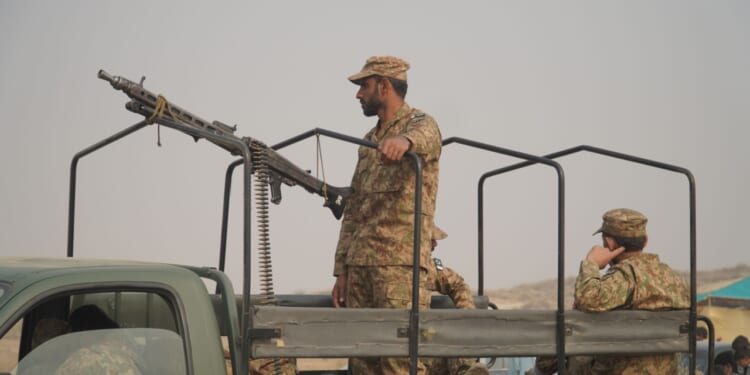Afghanistan’s embrace of India over Pakistan is a return to the geopolitical norm.
The rapid downturn in the Afghanistan–Pakistan relationship may have caught many observers off guard. This may appear especially jarring since the Pakistani military, the real power center in the country, was the midwife of the Taliban movement in the 1990s and supported its rise to power. It also clandestinely supported the Taliban in the first two decades of this century when it was at war with the US-supported government in Kabul. Islamabad openly rejoiced at the Taliban takeover of Afghanistan in 2021.
At that time, Islamabad had assumed that the Taliban would act as its vassals in Afghanistan, providing it the defense in depth it needed to continue its confrontation with India. A friendly government in Kabul would also neutralize the danger of a two-front conflict if Islamabad were embroiled in a shooting war with New Delhi. Afghanistan also acted as the training ground for Pakistan-supported terrorist groups that could infiltrate Indian-administered Kashmir.
Unfortunately for Pakistan, this turned out to be a colossal miscalculation. The Taliban, resentful of their dependence on Pakistan and its highhanded ways, has turned against its mentors. This became very clear earlier this month in the clashes on the Afghanistan-Pakistan border that left dozens dead on both sides. These clashes followed Pakistani aerial attacks in Kabul and Paktia province.
The Pakistani government implied that these attacks were aimed at Tehreek-e-Taliban Pakistan (TTP) targets. The TTP has been engaged in fighting the Pakistan army for years in the Khyber Pakhtunkhwa province bordering Afghanistan, which is populated by the same Pashtun ethnic group that forms the backbone of the Afghan Taliban. The two formations are ideological twins.
The Taliban added insult to Pakistan’s injury since the clashes coincided with Foreign Minister Amir Khan Muttaqi’s visit to New Delhi, where he issued dire warnings to Islamabad. Furthermore, in the joint statement issued at the end of his visit, Muttaqi condemned the terrorist attacks on Pahalgam in Kashmir attributed to Pakistan-backed groups, and both sides unequivocally supported the territorial integrity of each other, which, according to Indian interpretation, implicitly includes Kashmir.
Tensions in Afghanistan-Pakistan relations are not a new phenomenon and need to be seen in a proper historical perspective. In hindsight, the golden age of rapprochement between the two countries, from the mid-1990s to 2001 and again for a couple of years after the Taliban takeover in 2021, was an aberration in the long-term trend of tense, if not hostile, relations.
When Pakistan was carved out of British India in 1947 and applied for membership in the UN, Afghanistan cast the lone vote against its admission to the UN. Kabul’s opposition to Pakistan’s membership stemmed from the dispute over the Durand Line, which delineated the boundary between Afghanistan and British India. Afghanistan never accepted the legitimacy of the Durand Line and viewed it as a British imposition. This is an emotive issue for Afghanistan because the boundary divided the homelands of the Pashtuns, the politically dominant ethnic group in Afghanistan.
Pashtun irredentism on both sides of the border, fueled by Kabul’s rhetoric and support, bedeviled relations between the two countries. Pakistan sees this as an existential threat, fearing a pincer movement from India in the east and Afghanistan in the west. Even short of open hostilities, this puts Pakistan at a strategic disadvantage as it must divide its forces between the two fronts, rather than concentrate them on the eastern front against India. The tense relationship persisted under the various Afghan regimes, whether the monarchy of Zahir Shah, the republic of Daoud Khan, or the Soviet-backed Marxist regime.
Pakistan’s support to the Afghan insurgency in the 1980s, in collaboration with the United States and Saudi Arabia, was driven in large measure by its desire for a regime dependent on it. It succeeded in bringing one to power for a brief period between 1996 and 2001 when the Taliban ruled Afghanistan.
America’s War on Terror changed all that. In 2001, the Bush administration allegedly warned Pakistani president Musharraf to cooperate with the United States against the Taliban or else “be prepared to go back to the Stone Age.” Pakistan switched sides, ostensibly dumping the Taliban and providing the United States and its allies strategic access to Afghanistan that enabled them to overthrow the Taliban and install a new government.
However, at the same time, Islamabad tried to keep its options open by giving the Taliban leadership refuge in Quetta and allowing the group to continue low-level military operations against the US-backed government of Hamid Karzai. At the same time, Pakistan provided the United States with logistical support in its campaign against the Taliban. Largely because of these contradictory impulses driving Pakistan’s policy, its relations with Kabul remained frosty.
Pakistan’s support for the Taliban continued and was largely responsible for its victory over the US-supported regime in Kabul in 2021. With the Taliban regime dependent on Pakistani goodwill and support, this lopsided relationship grew increasingly intolerable for Kabul.
The major motivation behind Pakistan’s Afghanistan policy is to deny India a foothold in its western neighbor. India traditionally had good relations with Afghanistan, in part due to shared antipathy toward Pakistan. New Delhi was involved in several development projects in Afghanistan, perceiving Kabul as its gateway to Central Asia.
Disenchanted with its asymmetrical relationship with Islamabad and the Pashtun issue, Kabul has been cozying up to New Delhi, as the weeklong visit of the Taliban foreign minister demonstrated. What has really angered Islamabad is that Muttaqi chose New Delhi as the place to blast anti-Pakistan rhetoric.
This is music to Indian ears as it signals Kabul’s return to friendly relations with New Delhi and hostility toward Islamabad, advancing India’s strategic interests. India has rewarded the Taliban by announcing that it will reopen its embassy in Kabul and allow the Taliban to take over the Afghan embassy in Delhi. Formal recognition of the Taliban government is just around the corner. As often happens in international relations, the more things change, the more they remain the same.
About the Author: Mohammed Ayoob
Mohammed Ayoob is University Distinguished Professor Emeritus of International Relations, Michigan State University, and the author, most recently, of From Regional Security to Global IR: An Intellectual Journey (2024).
Image: Sumblistaan / Shutterstock.com.


















